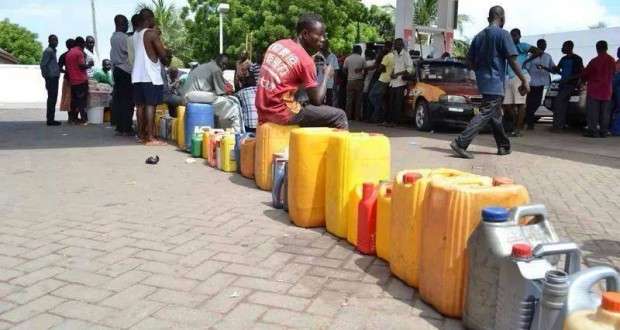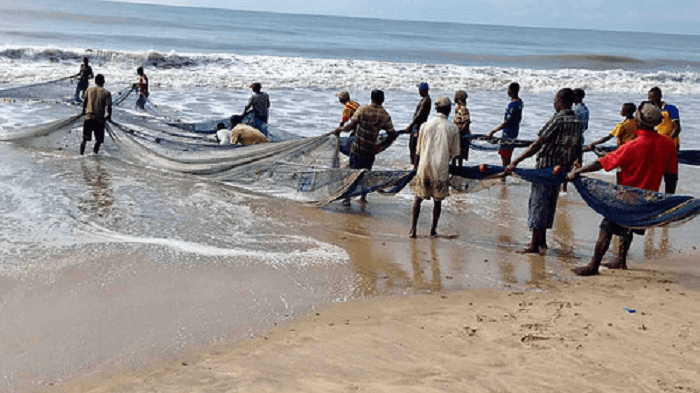Administrator at the National Premix Secretariat, Nana Abrokwah Asare, has revealed that premix fuel for fishermen has been highly subsidized by government.
According to him, the subsidy was initiated to avert the sale of premix fuel to fishermen at exorbitant prices, a situation which still persists. He indicated that government has had to deal with the issue for the “longest of time” and it is trying to curtail the menace identified in the system.
Mr Asare explained that these are things that the secretariat and government is aware of and government is consciously looking towards solving the problem.
“As I speak to you now, MMDCEs have also been integrated with regards to the sale and distribution of premix fuel. We have platforms where we publish lists of landing beaches receiving fuel etc. By way of education, I will like to state that premix fuel is highly subsidized by government, a gallon of premix fuel is now about GHC10.40p [but] ordinarily that should be costing about GHC50.”
Nana Abrokwah Asare
Mr Asare explained that the subsidy gap in the product “induces people to indulge in such illegalities” because there are so much profit that people can get out of the business. He noted that while government is trying very hard to subsidize premix fuel for fishermen, others, including “some of the fishermen themselves are also trying to make money” on the blindside of government.
In its bid to resolve the matter, Mr Asare emphasized that government has come a long way with regards to the distribution and sale of premix fuel to fisher folks. In the past, he explained that there were lots of issues and the current administration has done very well to reduce incidences of pricy sale of premix fuel.
“Currently, we’ve done a lot of education, we are doing a lot of enforcement but we believe the only way and the only solution to this problem is the use of technology. The Vice President, His Excellency Dr Mahamudu Bawumia has charged the ministry to see how we can fully automate these processes which we are working at.”
Nana Abrokwah Asare
Addressing issues of exorbitant sale of premix fuel
Commenting on how best to plug the loopholes identified among fishermen engaged in the exorbitant sale of premix fuel, Mr Asare highlighted that considering the composition of the landing beach committees, government has realized that it is high time fishermen take control of what happens at the landing beaches. Nonetheless, he revealed that unfortunately, there have been lots of occasions where most of these landing beach committee members connive with people who are not fishermen to sell premix fuel to them.
“So, if you go to a seven-member landing beach, we have the chief fisherman as the chairman of the landing beach committee. If you read our LI 233, section 22, it clearly spells out the composition of the landing beach… So, we expect that this committee will be honest enough to sell fuel to fisher folks because they control or manage the affairs of these landing beaches.”
Nana Abrokwah Asare

The administrator at the premix secretariat stated that due to the fact that premix fuel has other uses other than fishermen using it to ply their trade, it is easy to find chainsaw operators “who should be buying fuel at the full cost” trying to purchase premix fuel.
To avert the possibility of the premix fuel being siphoned, Mr Asare indicated that previously the tankers transporting premix fuel did not have tracking devices, “so you can have fuel loaded from TOR and then it ends up somewhere in Ashaiman”. This, he noted, has become a thing of the past.
“… That is why the subject now comes with automation where we want to modernize these landing beach sites where it’s going to be like mini filling stations, where we can have sensors in the tanks [and] we can have backend monitoring system in our office to ensure we see the levels at each landing beaches.”
Nana Abrokwah Asare
Mr Asare emphasized that because it’s a human institution, until a full automation is done, people will definitely find loopholes to make money. With this, he indicated that government has so far prosecuted three cases this year in court to deter people from the act. That notwithstanding, he opined that although there are sanctions to that effect, it’s not stringent enough to deter persons from siphoning fuel.
“We are collaborating with the law enforcement agencies but we want to make it difficult for the act itself to happen. If the act doesn’t happen, then we don’t even have to worry ourselves and spend money to enforce the law because enforcement of the law can be very expensive…”
Nana Abrokwah Asare
READ ALSO: Seplat Energy Receives Ministerial Approval To Acquire Exxon Mobil’s Nigerian Unit





















